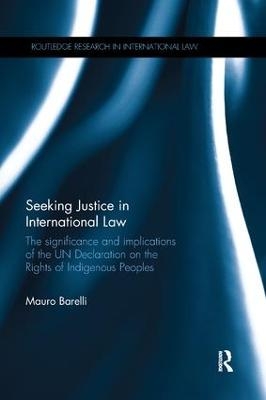
Seeking Justice in International Law
The Significance and Implications of the UN Declaration on the Rights of Indigenous Peoples
Seiten
2018
Routledge (Verlag)
978-1-138-61387-4 (ISBN)
Routledge (Verlag)
978-1-138-61387-4 (ISBN)
- Titel z.Zt. nicht lieferbar
- Versandkostenfrei innerhalb Deutschlands
- Auch auf Rechnung
- Verfügbarkeit in der Filiale vor Ort prüfen
- Artikel merken
Today human rights represent a primary concern of the international legal system. The international community’s commitment to the protection and promotion of human rights, however, does not always produce the results hoped for by the advocates of a more justice-oriented system of international law. Indeed international law is often criticised for, inter alia, its enduring imperial character, incapacity to minimize inequalities and failure to take human suffering seriously. Against this background, the central question that this book aims to answer is whether the adoption of the 2007 United Nations Declaration on the Rights of Indigenous Peoples points to the existence of an international law that promises to provide valid responses to the demands for justice of disempowered and vulnerable groups. At one level, the book assesses whether international law has responded fairly and adequately to the human rights claims of indigenous peoples. At another level, it explores the relationship between this response and some distinctive features of the indigenous peoples’ struggle for justice, reflecting on the extent to which the latter have influenced and shaped the former.
The book draws important conclusions as to the reasons behind international law’s positive recognition of indigenous peoples’ rights, shedding some light on the potential and limits of international law as an instrument of justice.
The book will be of great interest to students and scholars of public international law, human rights and social movements.
The book draws important conclusions as to the reasons behind international law’s positive recognition of indigenous peoples’ rights, shedding some light on the potential and limits of international law as an instrument of justice.
The book will be of great interest to students and scholars of public international law, human rights and social movements.
Mauro Barelli is a Senior Lecturer at The City Law School, City University London.
Chapter 1: Introduction Part 1 Chapter 2. The Legal Content of the United Nations Declaration on the Rights of Indigenous Peoples Chapter 3. The Legal Status of the UN Declaration on the Rights of Indigenous Peoples Part 2 Chapter 4. The UN Declaration on the Rights of Indigenous Peoples and the Human Rights Struggles of Other Groups in International Law Part 3 Chapter 5. The Political Power of the Global Indigenous Movement Chapter 6. Two Distinguishing Features of the Human Rights Claims of Indigenous Peoples Chapter 7. Conclusions
| Erscheinungsdatum | 08.08.2018 |
|---|---|
| Reihe/Serie | Routledge Research in International Law |
| Verlagsort | London |
| Sprache | englisch |
| Maße | 156 x 234 mm |
| Gewicht | 380 g |
| Themenwelt | Recht / Steuern ► EU / Internationales Recht |
| Recht / Steuern ► Öffentliches Recht ► Völkerrecht | |
| Sozialwissenschaften ► Ethnologie | |
| Sozialwissenschaften ► Politik / Verwaltung ► Politische Systeme | |
| Sozialwissenschaften ► Soziologie | |
| ISBN-10 | 1-138-61387-8 / 1138613878 |
| ISBN-13 | 978-1-138-61387-4 / 9781138613874 |
| Zustand | Neuware |
| Informationen gemäß Produktsicherheitsverordnung (GPSR) | |
| Haben Sie eine Frage zum Produkt? |
Mehr entdecken
aus dem Bereich
aus dem Bereich


